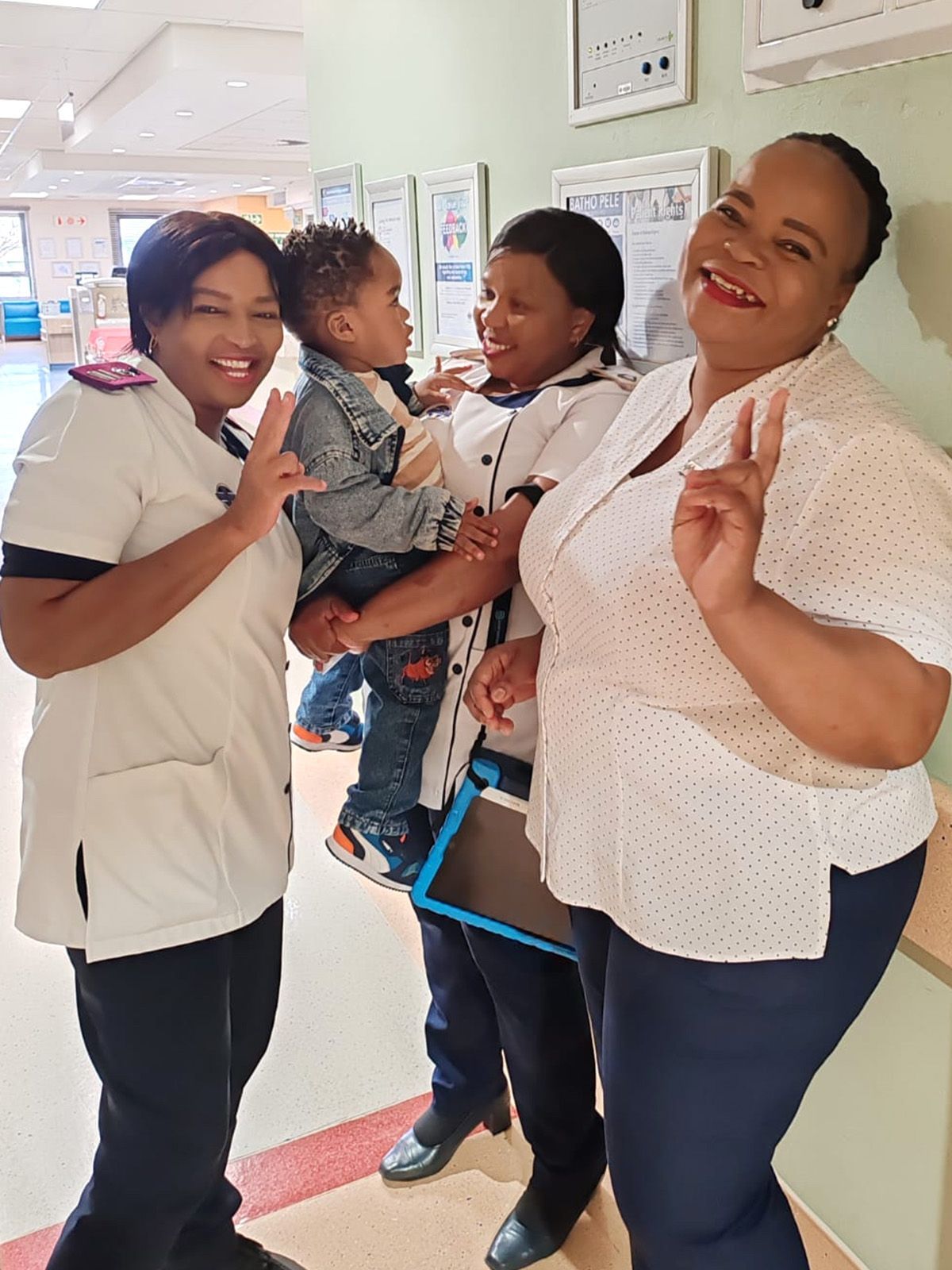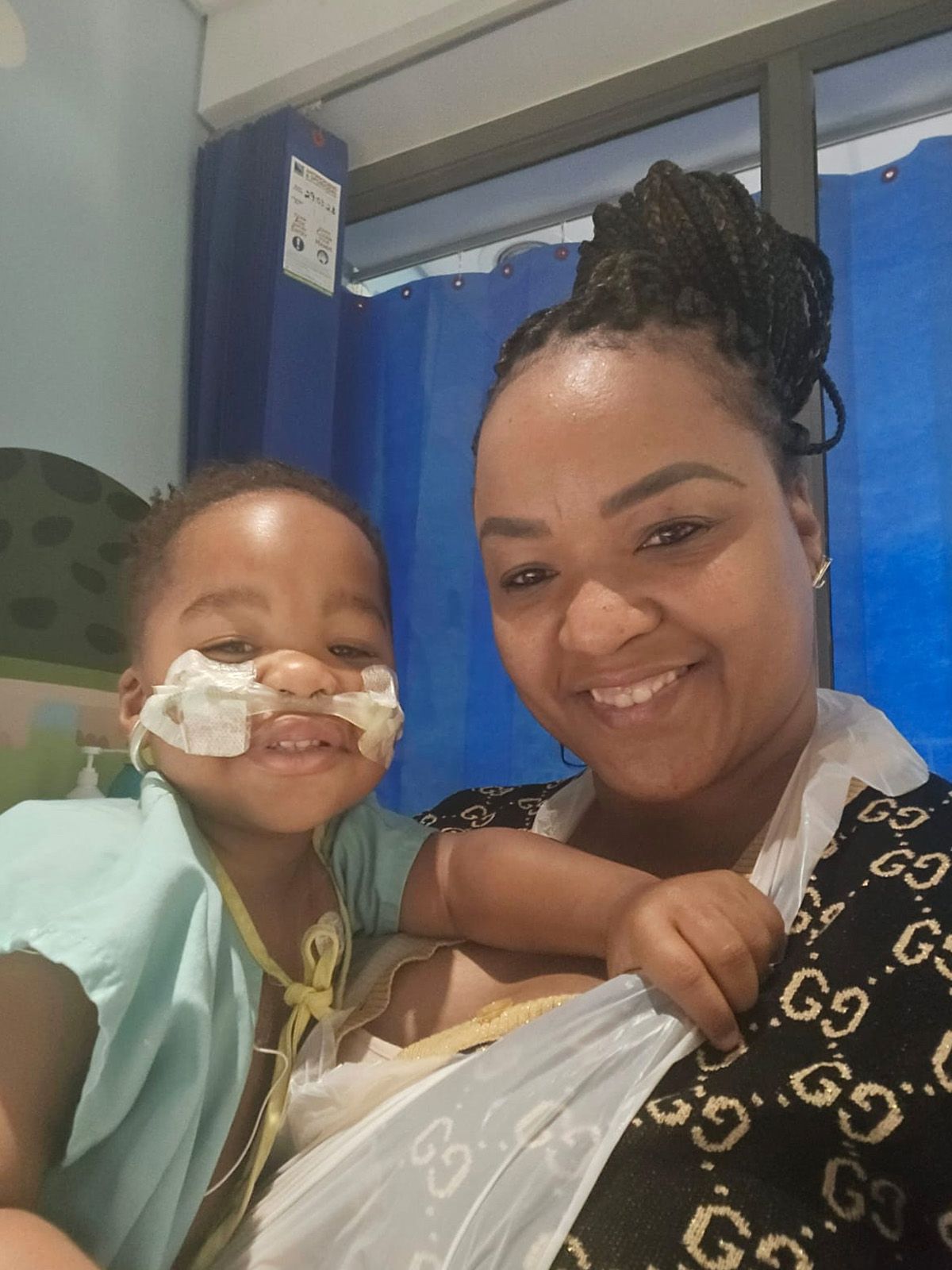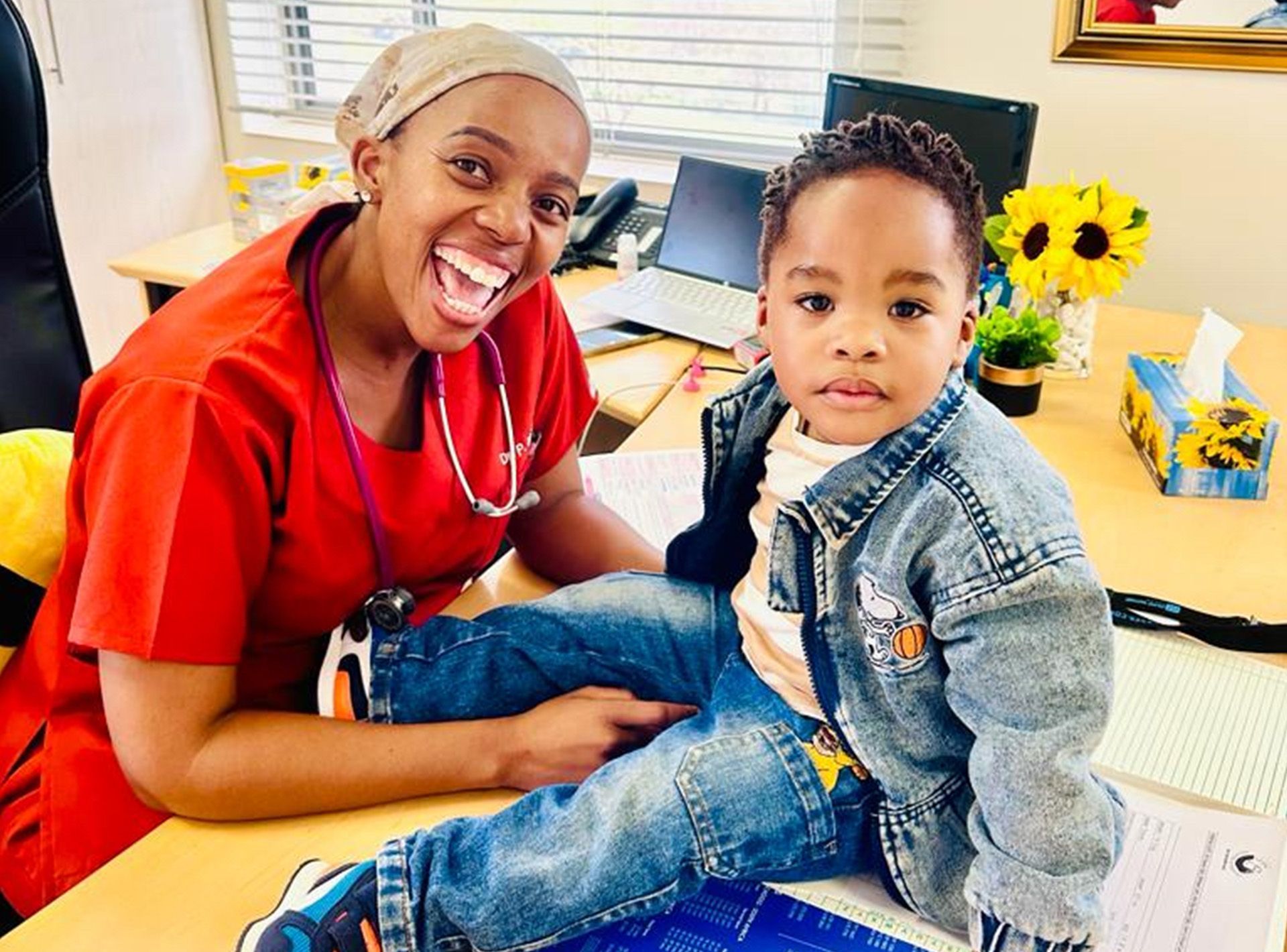Saving Sekani: paramedics praise mom’s CPR
Paediatric intensivist Dr Palesa Monyake and Sekani Nzima, who made a full recovery thanks to his mother’s knowledge of CPR and the medical teamwork from Netcare 911 and everyone involved in his care at Netcare Waterfall City Hospital.
Learn CPR, mom urges after saving toddler from near drowning
A toddler has made a full recovery after a near-fatal drowning thanks to his mother’s knowledge of cardiopulmonary resuscitation (CPR) and professional, caring medical teamwork.
“Our children, their cousin and some friends, including our neighbour’s daughter, were playing far away from our new pool, but when one of them came inside looking for a plaster Sekani must have been trying to follow her,” says his mother, Thandokazi Nzima.
“Suddenly, we heard the neighbour’s child, Rethabile Lehodi, screaming for help ‘Sekani fell in the pool’. It was such a shock that my sense of time became completely distorted. I was praying and praying as I ran to where she had pulled my boy out of the water and, through prayer, I became calm and was able to start performing CPR.
“I am a mining engineer, and although I attended CPR training, I’ve never had to perform it on a person – let alone my own son. I had to adjust the pressure for such a young child, and I wasn’t sure if I should interrupt CPR to turn him over. It was a frightening situation as a mother,” she says.
A neighbour called Netcare 911 for emergency medical assistance, and the Emergency Operations Centre helped coach Mrs Nzima on what to do for her 18-month-old son until help could arrive on the scene at their home near Silver Lakes in Pretoria East.
“Eventually, he coughed and showed signs of life. It didn’t take long for the ambulance to arrive, and it was as if everything came together to save Sekani,” she says.
“Arriving to find that Sekani was breathing was a relief, although he was not breathing as well as we would have liked,” Netcare 911 intermediate life support practitioner Wikus de Jager says.
The team checked his vital signs, and when Sekani was stable enough, he was transferred to the ambulance, where the team continued to give him oxygen while warming the little boy.
“We knew he was not out of the woods yet, and based on Sekani’s condition and the distance to the most appropriate hospital for his needs in peak hour traffic, the decision was made to airlift Sekani to Netcare Waterfall City Hospital via Netcare 911 helicopter emergency medical services (HEMS),” Netcare 911 advanced life support paramedic Jacques Andersen adds.
“The mother’s CPR was the game changer for Sekani. Most definitely, it was a deciding factor in her son’s survival and outcome, and I would encourage everyone to learn basic CPR as you never know when it could help to save a life,” he says.
“By the grace of God, there is a cul-de-sac right outside our house where the helicopter could easily land. My heart stood still as I saw my son being loaded into the helicopter, and I called out to him, ‘Sekani,” and a moment later, from inside the ambulance, I heard him cry out to me – it was such a relief to hear him responding,” Mrs Nzima says.
HEMS emergency care practitioners Megan Ellis and Tim Shipster looked after Sekani, keeping him warm and ventilated, on the journey to Netcare Waterfall City Hospital, where a specialist-led team was ready and waiting.
“It is extremely stressful for any parent when their child has a serious medical emergency. This was very time sensitive, and Sekani needed to be treated at a specialist facility. We assured the parents we would take the best possible care of their son,” Ellis says.
“Credit is due to the Netcare 911 ground crew who recognised the seriousness of Sekani’s condition and activated the airlift protocols to get him to the specialised paediatric intensive care unit at Netcare Waterfall City Hospital in the shortest possible time. Paediatric intensivist Dr Palesa Monyake is incredible; she and the team immediately placed Sekani on an oscillator machine to support his breathing.”
“We couldn’t be sure how long Sekani’s air supply had been cut off for a while in the water, and so we were very worried about the potential for brain damage,” Dr Monyake says.
Sekani was placed in a neuroprotective state, including a medically induced coma, and his temperature was kept cool to give his brain the best chance to heal from the hypoxia. The paediatric ICU team led by unit manager Sr Jabulile Nxumalo are highly experienced in the critical care of children.
“We recognised the parents’ pain and strong faith during the long days and nights ahead. What I appreciated from the first time we met Mrs Nzima and her husband was that they wanted to understand what was happening and whether their son would make a full recovery. At that stage, doctors were uncertain if their child would have a neurological impairment,” Sr Nxumalo says.
“In the paediatric ICU, we walk this journey with parents because the uncertainty can be very hard to cope with. As a nurse, I understand the medical environment, but if I go into a bank, I don’t understand the terminology used there, and so as a team, we try to guide and support the parents and help them interpret and navigate the care their child needs. It is the most rewarding thing for us to see a child go home fully recovered to their parents.”
“A few days later, Sekani developed severe aspiration pneumonia from the pool water in his lungs,” adds paediatric pulmonologist Dr Denise Parris, a key member of the paediatric ICU team who kept careful watch night and day as the parents prayed for their son’s recovery.
“Eventually, he turned the corner and was well enough to leave intensive care for high care and was then discharged home,” Dr Parris says.
“We are grateful to our ancestors, and to God for guiding the hands that saved Sekani. From our nine-year-old heroine neighbour Retabile who found him in the water, and the teamwork from the Netcare 911 operations centre, ambulance and helicopter medics, and Dr Monyake and the team who cared for him during his stay in hospital,” Mr Nzima says.
“Sr Jabulile and her team kept us grounded, calm and reassured, no matter how panicked we were, they kept their cool and remained professional. It's really not an easy thing to do, but the team was consistent at it. Our little boy was loved and cared for dearly, and my heart is full to have gone on this journey with the Netcare Waterfall City Hospital’s paediatric ICU team.”
Sekani’s sister, Asante, says she was very worried about her little brother. “I felt sad when Sekani was in hospital, and I am so happy he is back at home now and he can play again like before.”
“Now Sekani is fully recovered and as mischievous as ever. Anyone who sees him now would never imagine what he has been through in the last few months. We would strongly encourage everyone to learn at least the basics of CPR, things could have turned out very differently for us if we didn’t have this skill,” Mrs Nzima says.
Child drowning prevention toolbox
“Drownings can happen at any time of year, and in South Africa, we see a marked increase during the summer months,” says Netcare 911 spokeswoman Sarah Kekana.
Prevent drowning tragedies with these practical tips:
- Learn life-saving skills, including the basics of swimming and cardiopulmonary resuscitation (CPR).
- Know who to call in an emergency. Be prepared for any medical emergency with Netcare 911 on 082 911 and download the Netcare App, which includes Netcare 911 emergency call and geolocation functions and a 60-second callback option.
- Fence ponds, pools and water storage: Install a four-sided isolation fence at least 1.2m high with a self-closing and self-latching gate to control access to bodies of water.
- Be on the lookout. Drownings happen quickly and quietly. Never leave children to supervise each other, a responsible adult must always watch out for children near a pool, Jacuzzi or natural body of water.
- Stay within arm’s length of children under four around water.
- Don’t drink or be distracted by work, phone calls, technology, or anything else that may absorb your attention when watching children.
- Fit a pool net immediately after swimming and replace it every time.
- Don’t rely on armbands, floating toys, inner tubes, or devices to keep children safe.
- Teach children to swim, but never leave them unsupervised around water.
- Consider installing alarms. Various water alarms, such as a floating pool alarm or external security beams, can be installed to add to the precautions of fencing and supervision.
- Beware of drains. Children must be kept away from pool or Jacuzzi drains as hair or limbs could become trapped in the suction.
- Toilets, bathtubs, water features, fish tanks, pet water bowls and buckets. Children can drown wherever there is access to water, and a baby can drown in just 2.5cm of water.

Registered nurse Dikeledi Ramatlo, Enrolled Nurse Tholakele Dhladhla and unit manager of the paediatric ICU at Netcare Waterfall City Hospital Sr Jabulile Nxumalo are pictured with drowning survivor Sekani Nzima during a recent check up.

Mrs Thandokazi Nzima pictured with her son Sekani while he was recovering in Netcare Waterfall City Hospital.













